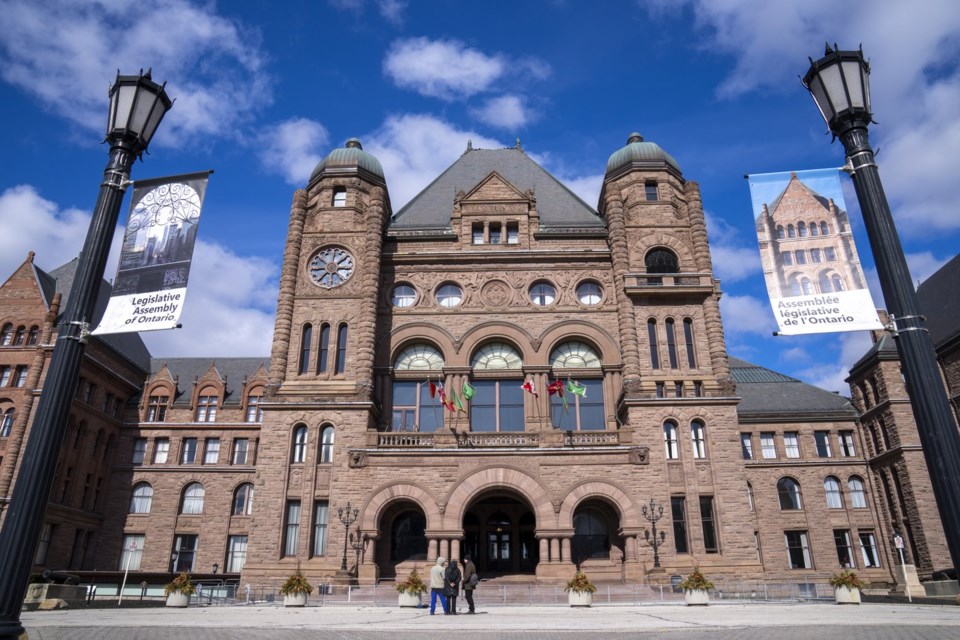TORONTO — Ontario is set to study how it can introduce involuntary addictions treatment for people involved in the correctional system, as it prepares to table a justice bill the government is positioning as being tough on crime.
The government intends to mandate treatment for people with addictions in jail, on probation and on parole, and officials will now look into how this can be done, how much it would cost, what sort of help they would need from the federal government to enact those measures, and consider lessons learned from other jurisdictions.
The idea of involuntary treatment has been a controversial one, with advocates arguing that it rarely works and treatment is significantly more successful when someone is ready to quit.
Health Minister Sylvia Jones said she wants to hear from experts and people with lived experience during consultations.
"Look, there's no doubt that there has been an increase in the use of illegal and, frankly, deadly drugs in our communities and, yes, in our corrections facilities," she said Thursday.
"We need to do the work to make sure that any programs that we bring forward are actually going to help people."
The announcement is part of a slate of measures the government is planning as part of – or associated with – a large justice bill set to be tabled Thursday. The legislation would make it easier to get restraining orders against domestic violence perpetrators and allow police to more easily seize electronic devices used to commit auto theft, among other measures.
But Attorney General Doug Downey's press conference about the bill was overshadowed by comments Premier Doug Ford made Wednesday about judges and justices of the peace, saying some are entitled and soft on crime and suggesting he wants to see an American-style system of electing judges.
It is not a plan the province is actually considering, Downey said Thursday.
"I think the frustration that it comes from is real," Downey said. "He's expressing what we're hearing at the doors and what we're hearing from people. It's not something that we're pursuing, but it is important that we go after the offenders, the violent and repeat offenders."
Ford ranted at a press conference Wednesday about judges and justices of the peace who give people bail multiple times, slamming "unelected" judges for "constantly overruling" a democratically elected government.
"Last time I checked, there hasn't been any judges elected," he said. "Maybe that's the problem. We should do what the U.S. does. Let's start electing our judges, holding them accountable. And that's my rant for the day, because I've just had it."
Ford's comments caught the attention of various legal and civil liberties groups, who roundly condemned them.
In a rare move, Ontario's three chief justices also issued a joint statement on judicial independence, which Ford called "a joke."
"Judicial independence is a cornerstone of our constitutional democracy," wrote the chief justices of the Court of Appeal for Ontario, the Superior Court of Justice, and the Ontario court of justice.
"An independent judiciary protects the public, not just judges. It means a society governed by the rule of law."
The upcoming justice bill also creates specialized prosecution teams to handle bail for serious and violent offences, forces those on probation who wear ankle monitors to pay for them and launches a comprehensive review of the bail system.
The move toward involuntary addiction treatment for people in jail, on probation and on parole is not contained in the legislation itself, rather officials will now look into how this can be done, how much it would cost, what sort of help they would need from the federal government to enact those measures, and consider lessons learned from other jurisdictions.
The ministry intends to present a plan to cabinet by this fall with a plan and options.
Two senior government sources who were not authorized to give information publicly say Ontario is looking more to the model in British Columbia, which includes involuntary addictions treatment for people with simultaneous mental health challenges, rather than Alberta's more sweeping approach.
Alberta Premier Danielle Smith's government recently tabled legislation that would allow parents, family members, health-care professionals, police or peace officers to apply for a treatment order. People using substances and deemed a risk to themselves or others could be apprehended by police and ordered into treatment in a secure facility for up to three months, with the possibility of six months in community-based treatment, under the bill.
British Columbia last week announced the opening of a 10-unit facility for involuntary treatment of people already in custody at the Surrey Pretrial Centre, and a second such facility is on the way.
In Ontario, more than 2,600 people died in 2023 from opioids, the last full year of data available, which marks a 50 per cent increase in deaths compared to 2019.
This report by The Canadian Press was first published May 1, 2025.
Allison Jones and Liam Casey, The Canadian Press



